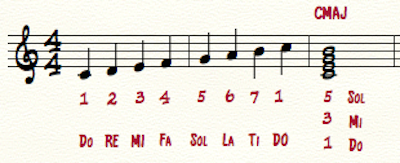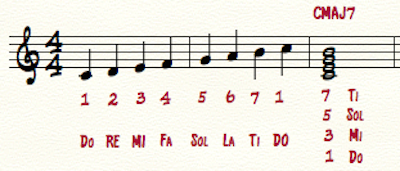Have you ever wondered how some singers can just improvise a melody line on the spot and sound great? Do you wish you could do the same? You totally can! All it takes is ear training, vocal practice and the confidence that comes with trusting your musical ideas & ear (which comes from lots and lots of practice).
This ear training exercise is great for any musician (singer or instrumentalist) interested in singing/playing jazz, blues, soul or gospel music. Jazz/blues influenced rock music uses these complex chords as well.
The exercise is based on the 5 basic types of 7th chords- Major, Dominant, Minor, Half Diminished and Fully Diminished.
You don’t have to understand the music theory behind this ear training exercise to benefit from it (you can just use your ears), but the more you understand about music the better. Singers get a bad rap for not knowing much about music theory. It always feels good to prove them wrong…
Jazz/Blues/Soul Ear Training Exercises
This ear training exercise is a melodic pattern that goes up and down each of the five 7th chords in succession. We change just one note each time to create the next new chord.

Here’s a slow break down of the exercise-
Here’s a practice track of the exercise- I play all the notes for you here.
Here’s a practice track with just the chords. This one is important. For this to be a proper ear training exercise, you need to be able to practice singing the pitches without a guide- just the chords.
For those of you who aren’t familiar with the solfege syllables “Me”, “Se” and “Te”, here is a chart to help you out.

A Little Lesson On Music Theory
What are 7th chords?
A basic three note chord is called a triad. It contains the root (1), 3rd & 5th of the scale.

Pop & Rock music use a lot of these simple 3 note chords.
7th chords are chords with 4 notes- the root, 3rd, 5th and 7th. We add an extra note to the top of the triad. It creates a more complex harmonic sound. These chords are used in Jazz, Blues, Soul & Gospel music as well as other styles influenced by jazz.

There are 5 basic types of 7th chords- Major (CM7), Dominant (C7), Minor (Cm7), Half Diminished (Cm7(b5)) and Fully Diminished (Cdim7).
Listen to the five chords types here-
What’s the point of practicing 7th chords ear training exercises?
In order to be able to improvise a melody or a riff/run, you need to be able to hear inside the chords you’re singing over. This means you need to be able to hear what notes are in the chords, so that you can choose notes that sound good and don’t clash with the music.
Improvisers are not just singing random notes when they riff or play with the melody or scat. They are using their trained ears to choose notes that sound good within the chords.
Do you have any questions about this lesson or music theory in general? Please leave a comment below and I will answer it!
Enjoy your practice and I’ll see you next week







Leave A Response